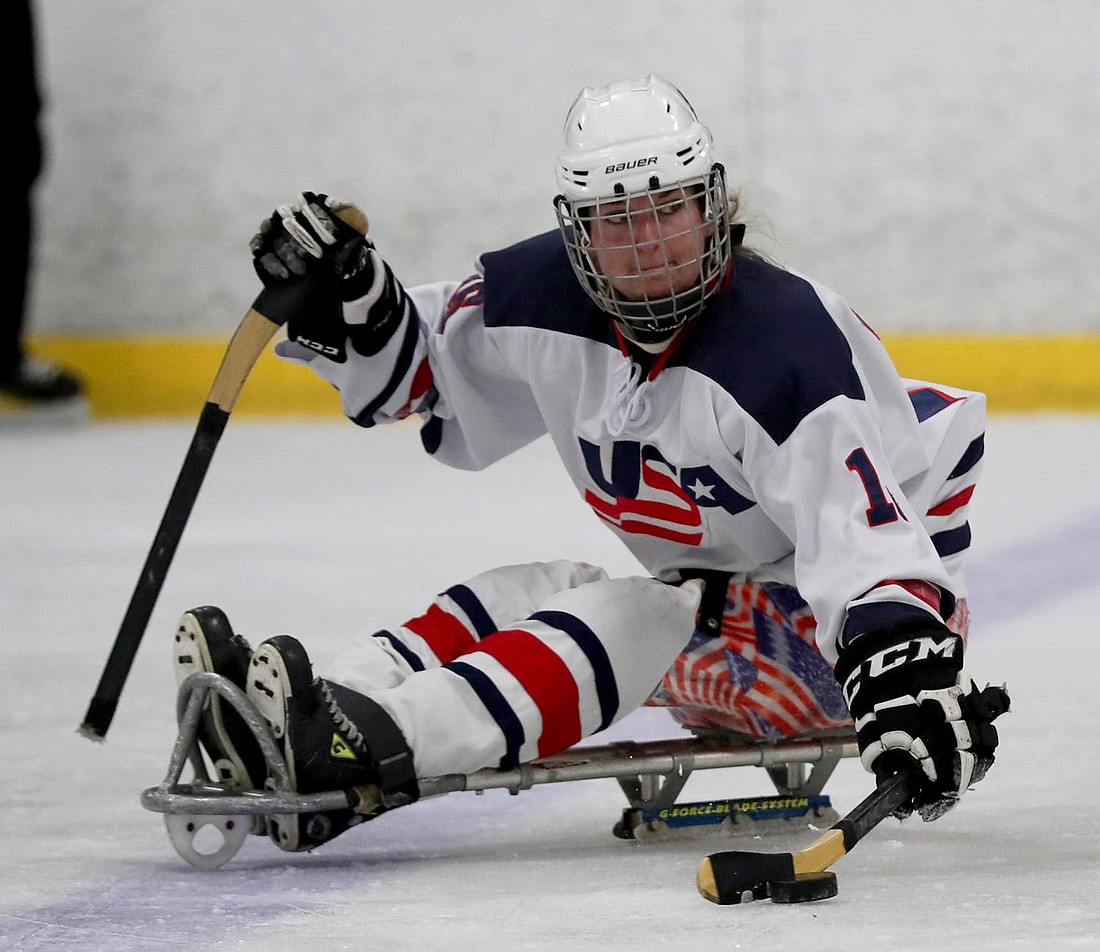- July 26, 2024
-
-
Loading

Loading

"The Star-Spangled Banner" was playing and a gold medal was rested around Monica Quimby's neck.
Even weeks later, Quimby has a tough time describing the feeling. The East County resident had previously experienced big wins, but none felt like this.
It came at the Para Ice Hockey Women's World Challenge, held Aug. 26-28 in Green Bay, Wisconsin. Team USA defeated Canada 5-1 in the gold medal game. Quimby, who was left paralyzed after a 2006 skiing accident, has played para ice hockey, also known as sled hockey, in international competitions since 2016, but none of them have mattered more than this one. That's because the Women's World Challenge was the first women-only event to be sanctioned by World Para Ice Hockey, the sport's governing body. Quimby and her USA teammates hope that securing that status, which took a decade to get, is the first step in the process to have women's sled hockey be part of the Paralympics.
"This was so important," Quimby said. "That moment (of the national anthem), you're just so present. It was a big deal for me and my teammates but also all women in sports."
As it stands, women are technically not barred from competing in the Paralympics' current version of sled hockey, which has existed since 1994 and is mixed gender. But only three women have seen the ice at the Games in the sport's history, despite a rule saying teams can carry an extra player on their rosters if there is a female player on it. This has caused U.S. players like Kelsey DiClaudio to speak against the sport's current iteration and support the fast-tracking of women's sled hockey.
"Internationally, para ice hockey is not a mixed event," DiClaudio, who had three assists in the Women's World Challenge gold medal game, wrote on Twitter in March. "Many countries don’t consider their female players for national teams. There’s need for change in this sport."
You can understand why this one felt different for all involved. It was the first sign of real change in the sport. That feeling — that this one was for real — permeated the entire experience, Quimby, a defensemen, said, starting with the team's July training camp in Buffalo, New York. It was fun, of course, but because the stakes were higher and more eyes were on them, the athletes wanted to win more than ever before. Quimby said there was a determination within the U.S. locker room that she had not felt before. The U.S. won all four of its games at the event; before the gold medal game, Quimby said, the team had little doubt of the outcome.
"We were a dominant force," Quimby said. "We had such an increase in speed and communication and overall talent."
The intensity shut off as soon as the clock hit zero. Quimby said the team celebrated by going out for Chinese food and heading to a karaoke bar, where Quimby and her teammates busted out locker room favorites like Miley Cyrus' "Party in the USA," La Roux's "Bulletproof" and a plethora of hits from the "Pitch Perfect" movies.
The gold medal game can be watched in full on the Paralympic Games YouTube channel. I'd recommend watching at least the first period, which contains four of Team USA's five goals. It will give you an idea of the kind of skill and stamina it takes to play this sport.
The path to the Paralympics will take at least eight years, with the sport having to meet certain checkmarks along the way, like securing teams that represent six countries or more. This year's event had three such teams — Team USA, Team Canada and Team Great Britain — plus a fourth team called "Team World" that was made up of individual players from various places. In an interesting twist, Team World finished with the bronze medal, beating Great Britain 5-0 in the third-place game. The hope is that Team World's athletes will take the experience they gained from the Women's World Challenge and spread it through their home countries via development camps and old fashioned word of mouth. Quimby said she is doing something similar in the U.S. early next year.; she'll be hosting a camp on a to-be-determined date in Tampa for players interested in learning the sport.
"The biggest thing is getting into hospitals and rehab centers," Quimby said. "If you can do a few clinics right after you get hurt, you can get exposed not just to our sport but a lot of sports. We're trying to help other countries with that and with funding and equipment, as much as we can. We're trying to help countries create the same backbone that the U.S. and Canada have."
Quimby and other veteran members of Team USA might not be on the ice when the sport does reach the Paralympics. To them, that matters less than the progress of the sport as a whole. Eight years down the road, the party after the Paralympics will dwarf Team USA's karaoke outing.
But for now — for the hope of a bright future it represents — the night, and the event, remain unforgettable.
"Being able to represent on our home soil was incredible," Quimby said.